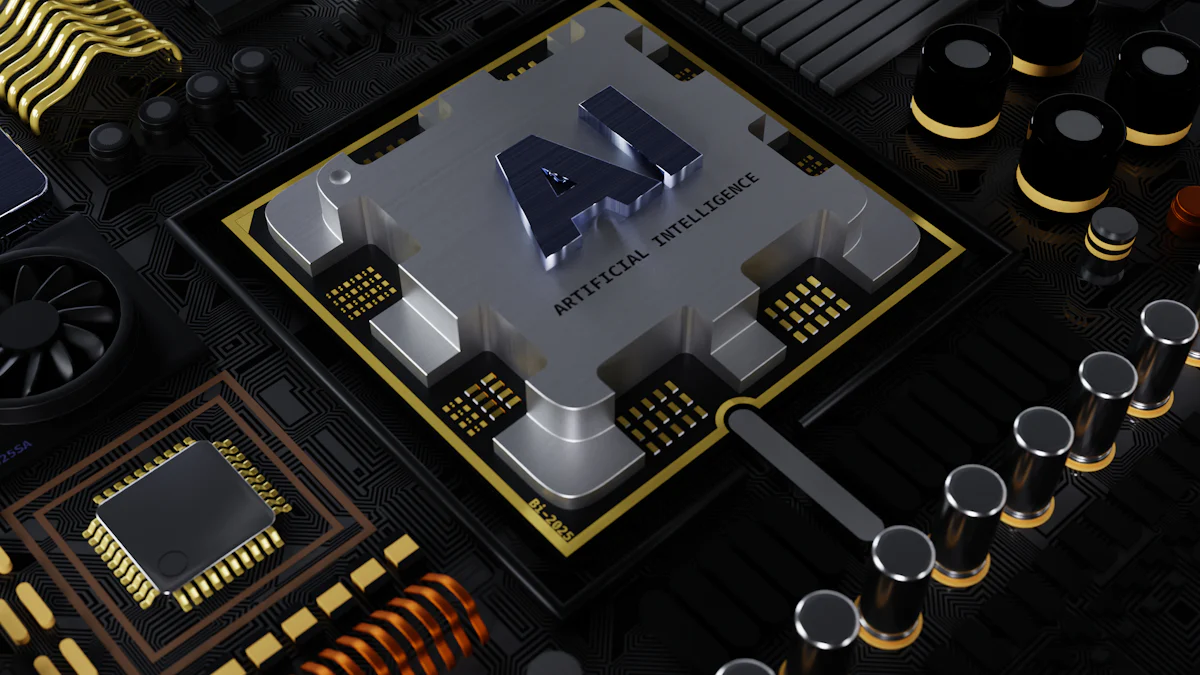The Ethics of Using AI for Human Simulation

Artificial Intelligence (AI) refers to the development of computer systems capable of performing tasks that typically require human intelligence. Human simulation involves using AI to replicate human behavior and interactions. The Ethics of Using AI in this context becomes crucial as AI's role in simulating human behavior grows. AI's widespread use has increased productivity, with 55% of executives acknowledging its benefits. As AI advances, ethical considerations must guide its development to ensure responsible and fair applications in society.
Understanding AI and Human Simulation

What is AI?
Definition and types of AI
Artificial Intelligence (AI) refers to the simulation of human intelligence in machines. These machines are designed to think and learn like humans. AI can be categorized into different types based on its capabilities:
Narrow AI: This type of AI specializes in a specific task. Examples include virtual assistants like Siri or Alexa.
General AI: This AI possesses the ability to perform any intellectual task that a human can do. It remains largely theoretical at this stage.
Superintelligent AI: This AI surpasses human intelligence and capabilities. It exists only in speculative discussions.
Current applications in various fields
AI finds applications across numerous industries, enhancing efficiency and innovation:
Healthcare: AI assists in diagnosing diseases, personalizing treatment plans, and managing patient data.
Finance: AI algorithms detect fraudulent activities and automate trading processes.
Transportation: AI powers driverless cars, optimizing routes and improving safety.
Retail: AI analyzes consumer behavior to personalize shopping experiences and manage inventory.
Manufacturing: AI streamlines production processes and predicts maintenance needs.
Human Simulation with AI
Techniques used in simulating human behavior
Simulating human behavior with AI involves several techniques:
Machine Learning: AI systems learn from data to predict human actions and preferences.
Natural Language Processing (NLP): AI understands and generates human language, enabling realistic conversations.
Cognitive Modeling: AI mimics human thought processes, drawing from cognitive psychology to replicate decision-making.
Examples of AI-driven human simulation
AI-driven human simulation manifests in various forms:
Virtual Assistants: These AI systems simulate human interaction, providing information and performing tasks.
Chatbots: AI chatbots engage in conversations, offering customer support and answering queries.
Artificial Societies: AI creates virtual societies where agents mimic human behavior, aiding in social science research.
AI's role in human simulation continues to expand, offering both opportunities and challenges. Understanding these technologies and their applications helps navigate the ethical landscape of AI development.
Ethical Considerations in AI for Human Simulation
The Ethics of Using AI in human simulation involves several critical considerations. As AI technologies advance, ethical issues become more pronounced, requiring careful examination and responsible action.
Privacy Concerns
Data collection and consent
AI systems often rely on vast amounts of data to simulate human behavior accurately. This data collection raises significant privacy concerns. Individuals must provide informed consent before their data is used. Without consent, the use of personal information becomes unethical. The Ethics of Using AI demands transparency in how data is collected and utilized. Companies must ensure that users understand what data is being gathered and for what purpose.
Potential for misuse of personal information
The potential misuse of personal information poses another ethical challenge. AI systems can inadvertently expose sensitive data, leading to privacy breaches. The Ethics of Using AI requires robust security measures to protect personal information. Developers must prioritize data protection to prevent unauthorized access and misuse. Ethical AI development involves creating systems that respect user privacy and maintain trust.
Bias and Fairness
Addressing algorithmic bias
Algorithmic bias presents a significant ethical issue in AI-driven human simulation. AI systems can inherit biases from the data they are trained on, leading to unfair outcomes. The Ethics of Using AI emphasizes the need to identify and mitigate these biases. Developers must implement strategies to ensure that AI systems make unbiased decisions. Regular audits and diverse data sets can help address this challenge.
Ensuring equitable outcomes
Ensuring equitable outcomes is crucial in the Ethics of Using AI. AI systems should provide fair and just results for all users. Developers must strive to create algorithms that do not favor one group over another. The Ethics of Using AI involves designing systems that promote equality and fairness. By prioritizing equitable outcomes, AI can contribute positively to society.
Accountability and Responsibility
Who is responsible for AI actions?
Determining responsibility for AI actions is a complex ethical issue. When AI systems make decisions, it can be challenging to assign accountability. The Ethics of Using AI requires clear guidelines on who is responsible for AI actions. Developers, companies, and users must understand their roles and responsibilities. Establishing accountability ensures that AI systems operate ethically and transparently.
Legal and moral implications
The legal and moral implications of AI actions are significant. The Ethics of Using AI involves understanding the potential consequences of AI decisions. Legal frameworks must evolve to address the unique challenges posed by AI technologies. Ethical AI development requires considering both legal and moral aspects. By doing so, society can harness the benefits of AI while minimizing potential harm.
The Ethics of Using AI in human simulation is a multifaceted issue. Addressing privacy concerns, bias, and accountability is essential for ethical AI development. By prioritizing these considerations, developers can create AI systems that benefit society while respecting individual rights.
Balancing Benefits and Risks

The Ethics of Using AI in human simulation involves weighing the potential benefits against the risks. As AI technologies advance, understanding these aspects becomes crucial for responsible development and application.
Potential Benefits
Advancements in healthcare and education
AI holds the promise of transforming healthcare and education. In healthcare, AI can assist in diagnosing diseases more accurately and swiftly. It can analyze vast amounts of medical data to identify patterns that might elude human doctors. This capability leads to personalized treatment plans, improving patient outcomes. In education, AI can tailor learning experiences to individual students. It adapts to their learning pace and style, making education more effective and engaging. These advancements highlight the positive impact of AI on essential sectors.
Enhancing human capabilities
AI enhances human capabilities by performing tasks that require precision and speed. It can process information faster than humans, providing insights that drive innovation. In industries like manufacturing, AI optimizes production processes, reducing waste and increasing efficiency. AI also aids in creative fields, offering new tools for artists and designers. By augmenting human abilities, AI opens up possibilities for growth and development across various domains.
Potential Risks
Loss of jobs and economic impact
Despite its benefits, AI poses significant risks, particularly concerning employment. Automation powered by AI can lead to job displacement. Industries that rely heavily on manual labor may see a reduction in workforce needs. This shift can result in economic challenges for affected individuals and communities. The Ethics of Using AI requires addressing these concerns by fostering retraining programs and creating new job opportunities in emerging fields.
Ethical dilemmas in decision-making
AI systems often face ethical dilemmas in decision-making processes. For instance, autonomous vehicles must make split-second decisions that could impact human lives. The Ethics of Using AI demands that developers consider these scenarios carefully. Ensuring that AI systems align with ethical principles is vital. This alignment involves programming AI to prioritize human safety and well-being. By addressing these ethical challenges, society can harness AI's potential while minimizing harm.
The Ethics of Using AI in human simulation necessitates a balanced approach. Recognizing both the benefits and risks allows for informed decision-making. By prioritizing ethical considerations, developers can create AI systems that contribute positively to society. This balance ensures that AI technologies enhance human life without compromising ethical standards.
The Role of Regulation and Policy
The Ethics of Using AI in human simulation necessitates a robust regulatory framework. As AI technologies evolve, existing laws and guidelines must adapt to ensure ethical practices. This section explores current regulatory frameworks and future directions for AI regulation.
Current Regulatory Frameworks
Overview of existing laws and guidelines
Several countries have established laws and guidelines to govern AI usage. These regulations aim to ensure that AI applications align with ethical standards. For instance, the European Union has proposed new regulations for AI technology. These regulations focus on promoting ethical and trustworthy AI applications while fostering innovation and competitiveness in the European market. Similarly, the United States Federal Trade Commission (FTC) provides guidelines for companies using AI algorithms. The FTC emphasizes transparency, accountability, and fairness in AI-driven decision-making processes. These frameworks serve as a foundation for ethical AI development.
Challenges in enforcement
Despite the existence of these regulations, enforcing them presents significant challenges. Rapid advancements in AI technology often outpace the development of legal frameworks. This gap can lead to inconsistencies in how regulations are applied. Additionally, the global nature of AI development complicates enforcement. Different countries may have varying standards, making it difficult to establish a unified approach. The Ethics of Using AI requires addressing these challenges to ensure effective regulation. Policymakers must collaborate internationally to create cohesive guidelines that protect individuals and promote ethical AI use.
Future Directions
Proposals for new regulations
To address the evolving landscape of AI, new regulatory proposals are essential. Policymakers must consider the unique ethical challenges posed by AI technologies. Proposals should focus on enhancing transparency and accountability in AI systems. For example, regulations could mandate that AI developers disclose how their systems make decisions. This transparency would help users understand AI actions and build trust. Additionally, new regulations could require regular audits of AI systems to identify and mitigate biases. By implementing these measures, policymakers can ensure that AI technologies align with ethical principles.
Encouraging ethical AI development
Encouraging ethical AI development involves more than just regulations. It requires a cultural shift towards responsible AI practices. Companies and developers must prioritize the Ethics of Using AI in their work. This commitment involves designing AI systems that respect user privacy and promote fairness. Educational initiatives can play a crucial role in fostering this culture. By educating developers and users about ethical AI practices, society can create an environment where ethical considerations guide AI development. Encouraging collaboration between governments, industry leaders, and academia can also drive ethical AI innovation.
The Ethics of Using AI in human simulation relies heavily on effective regulation and policy. By understanding current frameworks and exploring future directions, society can ensure that AI technologies benefit humanity while adhering to ethical standards.
The blog explored key ethical issues in AI-driven human simulation, such as privacy concerns, algorithmic bias, and accountability. These challenges highlight the need for ongoing dialogue and collaboration among developers, policymakers, and society. As AI continues to evolve, stakeholders must engage in transparent discussions to address these ethical dilemmas. The United States Federal Trade Commission (FTC) emphasizes transparency, accountability, and fairness in AI decision-making. This serves as a call to action for responsible AI development. By prioritizing ethical considerations, society can harness AI's potential while safeguarding human values.
See Also
Utilizing AI for Simulating Intricate Scenarios in Research
Creating Scholarly Papers Ethically Using AI
Authors Partnering with AI for Innovative Writing
